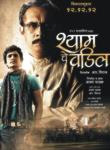‘Ajinkya’ defines new meaning of success
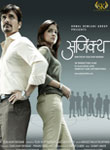 |
Rating: na
Banner: SK Production Films & Sandesh films International. Producer:Sandeep Kelwani Director:Tejas Deoskar Music:Susmit Limaye Camera:Abhijit Abde Cast: Sandeep Kulkarni, kadambari kadam, Sarika Nilatkar Movie Review by: Ulhas Shirke |
Champions are not made by a Coach. The actual duty of a good Coach is to make a player capable of playing the game to its perfection giving 100% through his performance. The rest is up to the player or a team to use their own skills at any given situation. New Marathi film ‘Ajinkya’ produced by Sandeep Kelwani and director Tejas Deoskar, both Basketball players from Nagpur, is based on the life of a basketball Coach.
The film tries to peep into the life of a couple Anant ( Sandeep Kulkarni) and Saee ( kadambari kadam) who are in their eighth year of married life. While Sandeep, besides working in the office, is also a basketball coach; Saee is an executive in a multinational company. Both love each other, but Sandeep’s passion for the game and his keeping away from home after office hours, disturbs Saee, who feels lonely. One day, the argument hots up and Sandeep declares his involvement, due to which his team wins. “In case his team loses any game, he would quit coaching,” he declares. The team loses and Anant being adamant, decides to take a break. He even goes to the extent of taking a transfer from his office to Aurangabad, so as to keep himself away from his wife.
Sandeep Kulkari, Kadambari KadamAt the new place Aurangabad, Sandeep is unable to sit quiet during the evening hours. One day, when his former basketball colleague Bhavna( Sarika Nilatkar) from Nagpur, visits him in Aurangabad, she expresses pity on his condition and makes fun of his act of stupidity. This makes Anant think seriously over his decision. When he notices few children playing football on the deserted basketball court; he approaches them and suggests to play basketball instead. He agrees to coach them.
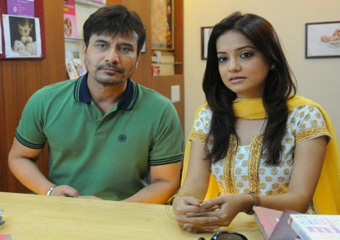
However, Anant’s training ideas are not easily accepted by the youngsters, as they just prefer playing this game for past time. Realising their personal problems, Sandeep decides to change his approach. When he gets a proposal from a local sports body to send their club’s team for a Competition; he finally agrees to train them but refuses to accompany the team. In the meanwhile, he remains in touch with his wife, by paying a surprise visit.
The team trained by Anant puts up a good performance, much above the expectations of the Coach. When Anant reaches the venue, we see the climax taking place, with Semi finals and final match of his team. This concluding part is not predictable, sending a timely message -‘ It’s not always about winning! to all those into sports field, especially those into coaching. It defines the new meaning of success.
Some of the scenes, related to the problems faced by the players, have been shot well by director Tejas Deoskar, including the passion for the game witnessed in Anant’s behaviour. But, he has shown the Coach as a ring master all the time. It would have been better, if he had shown him actually in some action scenes. Sandeep would have certainly obliged. One can understand about Anant’s colleague Bhavna( Sarika Nilatkar), who is shown returning back to training, few years after marriage. But, to show the lead man in action was possible. The film does not deviate from its theme from start to finish. The director has not made use of humour much through screenplay and dialogues, though there was scope for the same.
Nevertheless, looking at the sincerity in presenting this story and efforts taken to promote the game of basketball, besides delivering a message for sports lovers, ‘Ajinkya’has turned out to be a well made film. It’s almost a ‘one man show’ by actor Sandeep Kulkarni, who seemed to be totally involved into his character. The intensity with which he gets involved into his character, is to be highly appreciated. Kadambari kadam has played her part well, through perfect body language in the role of Saee, where she voices the concern of all such women facing similar situation. Sarika Nilatkar has limited scope; but it was nice to see her, after a long break. The youngsters have played their parts well. Susmit Limaye’s music is just apt for different situations. But, Abhijit Abde’s photography is good. He has shot the match sequences on huge indoor court, very well.
‘Aamhi Chmakte Taare’ – shows the way to shine in darkness
 |
Rating: ★★ ½
Banner: Sainath Chitra Pictures. Producer:Deepak S Choudhary, Prakash A. Jadhav Director:Prakash jadhav Music:Shreerang Aras Camera:Unmesh Kabare Cast: Bharat Jadhav, Prasad Oak, Nisha Parulekar, Reema Lagoo, Mr. Sachin Pilgaonkar, Manasi Magikar, Anand Abhyankar, Sneha Raikar, Nirmala Kotnis, Sanjay Desai, Satish Pulekar, Yogesh Mahajan and child artiste Indrajeet More. Movie Review by: Ulhas Shirke |
The best way to defeat darkness is to display the brighter side of yourself. Latest released Marathi film ‘Aamhi Chamakte Taare’ deals with one such social issue, which is so relevant today, to create awareness in the society. The film revolves around a 4th standard student Sachin( Indrajeet More) , who is adopted by a well to do couple- Sameer and Sonali ( Prasad Oak & Nisha Parulekar).It so happens that five years after their marriage, the happily married couple come to know that Sonali cannot give birth to a child. So, on the advice of a family friend and neighbor, Dr. Vinay( Yogesh Mahajan) who is a Gynecologist, they adopt a few months old child; whose parents have passed away. When this bright boy Sachin, while studying in 4th standard in a good school from Mumbai, faints on two occasions; he is tested +ve for HIV during investigations. The parents hide this reality from the boy and his old grandparents.
The trouble begins when during the annual medical camp in his school, the parents are called by the school principal( Reema Lagoo) to inform the parents, who are already aware of the ailment of Sachin. Though the principal, the class teacher and the School Peon – Ganpat mama are sympathetic towards the child and prefer to remain silent on this issue; the news leaks through other teaching staff. The parents of other children then object to Sachin’s presence in school.
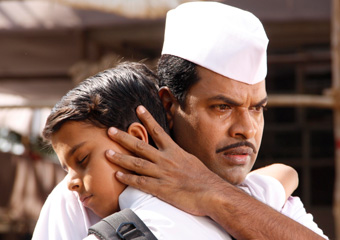
The little child, who is looking for friends, is then admitted to a special school for such children, where he finds real happiness. Through this school, he takes part in the Inter School Music competition hosted by his previous school; where he wins the hearts of all his old friends, including the Judge of the competition Mr. Sachin Pilgaonkar Mr. Sachin Pilgaonkar. The film’s story which is originally written by Anant Sutar has been expanded by Deepak S Chaudhary on the direction of Editing specialist Prakash Jadhav.
The well presented screenplay of this film, goes on to convey a timely message to the society, to change their outlook towards such HIV affected children. Meaningful lyrics, supported by good music from Shrirang Aras, makes this film musical, besides its thought provoking subject. Child artist Indrajeet More, who plays the role of little Sachin, has played his role remarkably well. Prasad Oak and Nisha Parulekar play perfect understanding parents. Both of them have expressed their emotions clearly, through their spontaneous expressions, with every scene they have faced.
The film is a tribute to Anand Abhyankar, who passed away recently, in an unfortunate car accident. In the role of a concerned and caring grandfather, he has clearly displayed that the Marathi film industry has lost a talented actor. In fact, the very first scene of the film, opens with him. Manasi Magikar supports well as his wife. In the role of Principal, Reema Lagoo does well, while Sneha Raikar, the popular kind hearted Mother and Mother in law of Marathi small screen, plays the role of an encouraging class teacher with ease. In the character of Ganpat mama, the school peon, Bharat Jadhav impresses in all those emotion filled scenes. Others in the supporting cast, including a big team of children, have given natural performances.
Director himself being an editor, the film’s climax has been restricted to minimum time to avoid this otherwise time consuming competition. He has rather focused his attention more on the main subject. The only drawback is one song picturised on the family doctor- friend and his wife in the beginning of the film, which looks inappropriate. Otherwise, the film has succeeded in educating the masses through its sensible subject.
‘Vijay Aso’ shows the way to eliminate Bad Politicians
 |
Rating: na
Banner: Artha Motion Pictures, Nirmit Nirmitee Producer:Chandresh Bhanushali, Shashank Kotiyan, M. K. Sundaram, Gurunath Mithbavkar Director: Rahul Jadhav. Music:Debutant Amitraj Cinematography:Rahul Jadhav Cast: Chinmay Mandlekar, Namrata Gaikwad, Ganesh Yadav, Amita Khopkar, Kedar Shinde, Janardan Parab, Priyadarshan Jadhav, Rohan Gujar, Mangesh Kawade, Vishnu Kokane. Movie Review by: Ulhas Shirke |
Many Marathi films have shown in the past, how the shrewd politicians exploit their loyal party workers and when time comes, they expect them to sacrifice even their lives for themselves. In the past, film like ‘Zenda’ showed such characters. Through many Bollywood films, we have seen the politicians finishing off their own loyal workers, after they achieve what they desired for.
New Marathi film ‘Vijay Aso’ shows the loyalty of one such young loyalist party worker Shankar Gawade (Chinmay Mandlekar), who with the help of his supporters is ready to even sacrifice his life for his Boss- the Forest Minister of Maharashtra – Mr. Prakashdada Jadhav (Murali Sharma). Prakashdada is into all illegal trade and is also involved in a scam. The media is exposing him from time to time; but Prakashdada manages to cover up the issues using his influence in ruling party.
When TV Journalist Shrikant Pathak (Ganesh Yadav) exposes Prakashdada, through a sting operation carried out on his Forest department secretary, Shankar dares to slap Shrikant in his office after damaging his office furniture, with the help of his team. In fact, Shankar plays an agent to supply people for different public rallies organized by Politicians. Journalist Shrikant is well aware of that and he also gets a clue about the dirty game planned by Prakashdada , using Shankar’s people to teach a lesson to his party chief , when he gets the news about his removal from the Ministry.
When Shankar’s people are killed in the police firing; during a rally, as per Prakashdada’s plan, Shankar boils in revenge against Prakashdada. At this moment, Shrikant comes to his rescue and saves Shankar’s life. He educates Shankar and advises him to take his revenge in a different manner. The climax of the film is not predictable, as Shankar succeeds in his mission in a different way. The film not only shows the way to eliminate bad politicians; but also makes the loyal workers aware of the moves of their leaders. It also highlights the present situation in the state of Maharashtra, which is full of scams and the dirty games played by politicians to retain their Ministry.
Script of the film is nothing new; but it sends a strong message to the unemployed youngsters; especially the young party workers, who are used by the Politicians. It also shows how a shrewd politician eliminates his own blood relation, when it comes to gaining sympathy to retain his position. Screenplay by Chinmay Mandlekar & Vivek gore is filled with action packed scenes, besides few emotion filled sequences.
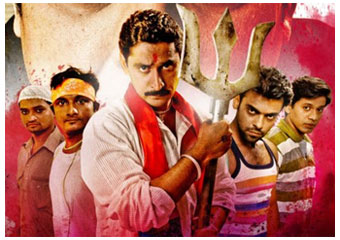
In the role of Shankar Gawde, Chinmay Mandlekar perfectly fits into that character, which is developed by himself, through the script. He is the new angry young man of Marathi films, walking on the footsteps of Nana Patekar. Watch him taking the revenge in the climax and you will start believing his ability. Murali Sharma poses a challenge to all those villains in Marathi film industry. After his appearance in ‘Ajintha’ and ‘ Hello Jai Hind!’, he seems to have worked very hard on his diction in marathi. He plays a cunning politician in his own style to impress one and all. Don’t be surprised, if he is nominated as an actor in negative role in forthcoming popular awards.
Namrata Gaikwad has limited scope; but she has played her part well, especially in emotion filled sequences. Ganesh Yadav in the role of a TV journalist does a fine job. Among the supporting cast, Veteran Janardan Parab, versatile Amita Khopkar, Kedar Shinde and other young artistes have played their parts very well. Debutant Amitraj has offered good music on meaningful lyrics by team of Guru Thakur, Sachin Darekar, Rupesh and Ashish. Imran and Faisal Mahadik have done a skillful editing work. Last but not the least, Cinematographer and director Rahul Jadhav in his dual role, has used his creativity in presenting some of the sequences, creating the desired impact. Though this film is based on same old Political theme, the presentation part is good.
Shyamche Vadil- stands up for suffering fathers
|
Rating: na
Banner: 459 Entertainment Producer: Ajay Pathak Director: R. Viraj Music: Soham, Aditya and Nikhil Cinematography: Sandy Cast: Mohan Agashe, Tushar Dalvi, Vinay Apte, Sulekha Talwalkar, Rima Lagoo, Vidyadhar Joshi, Chinmay Udgirkar, Smita Talwalkar and Shekhar Navre. Movie Review by: Ulhas Shirke |
Gone are the days, when housewives used to wait for their husbands to return home, to serve them dinner and then eat their food in the kitchen. Today, women are working shoulder to shoulder with men. At home front, we find both husband and wife working and returning home late hours in the evening, depriving time for their children.
The cases of wife working and husband sitting at home jobless and taking care of the children are not unheard. In such cases, generally we find clashes at home between husband and wife over money matters, which finally results into divorce.
However, the latest film ‘Shyamche Vadil- Ek Nave Parva’ produced by Ajay Pathak and directed by R. Viraj, present one couple, where the husband –Madhav( Tushar Dalvi) becomes jobless, soon after marriage; as he suffers in his business, due to cancellation of huge export order. Luckily for him, his wife( Sulekha Talwalkar) gets a job in a multinational bank. The selfish wife however warns her husband to earn for their living so as to buy day to day grocery and pay electricity bill. She however takes care of her child and spends towards his education.
The wife doesn’t leave a single opportunity to humiliate her husband in front of her son. This keeps on going till the son Shyam attains 22 years of age and turns a Rock Singer. The humiliation of his father forces Shyam to approach his lawyer aunty ( Reema Lagoo) to secure divorce for his father. But, he comes to know the hurdle of section 498(B), as he is well aware that his father would not like to wash the dirty linen in Public. So, he takes help of social networking site and opens a page in the name of ‘Suffering fathers’ and gathers good support from hundreds of young children who show willingness to support him in the appeal.
What transpires has been clearly suggested in the surprise climax of this film. The film has attempted a new theme to go with the changing time. Very cleverly the director has used the sufferings of the son coming out through his emotions in the songs delivered by him. Instead of turning to bad habits, the youngster opts for music to relieve his stress, is the best example he has placed before such youths sailing in the same boat.
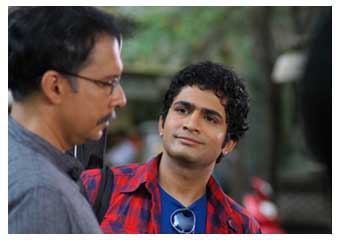
Some of the scenes in the film, like the wife driving away her husband and son from home during late evening hours and the wife raising her hand on her husband look unrealistic. However, the request for amending the section 498(b), to secure hassle free divorce, seems a good suggestion coming through this film. The sincere effort of the film maker to present this thought provoking theme combined with Rock music as its base, is to be appreciated. It has therefore become an universal appeal. The music by the trio comprising of Soham, Aditya and Nikhil is impressive.
Looking at the performances, Tushar Dalvi plays an ideal and patient husband who sacrifices his life for proper upbringing of his son. Sulekha Talwalkar fits into the character of a shrewd and self centred mother. Both have played their roles according to the demand of the script. Chinmay Udgirkar who makes his film debut through this film, gives a satisfying performance. In the supporting roles Reema Lagoo, Dr. Mohan Agashe, Vinay Apte, Vidydhar Joshi have offered good support while Smita Talwalkar and Shekhar Navare appear in two scenes in guest appearance. The Music director trio have themselves played the friends of Shyam, which was a good thinking.
To describe the film in short, ‘Shyamche Vadil’ stands up for suffering fathers in the society and also sends a strong message to the Judiciary to rethink over seeking amendment to a particular section, which would prevent the aggrieved couples from washing the dirty linen in Public.
‘Mokala Shwaas’ – A path breaking film
 |
Rating: na
Banner: Manasi Movies Producer: Bhausahe Bhoer, Rajesh Kumar Sakala Director: Kanchan Adhikari Music: Milind Ingale Cammera: Shekhar Anna Ayar Cast: Sharad Pokshe, Prateeksha Lonkar, Mohan Joshi, Sushant Shelar, Mrunmayee Deshpande, Neha Gadre, Aishwarya Tupe, Joti Subhash. Movie Review by: Ulhas Shirke |
Foetal sex determination and sex selective abortion by some medical professionals is a major social problem in India. Time has changed, but still in our country a section of the society don’t prefer a girl child in the family. Social discrimination against women and a preference for sons have been promoted by such people, who unfortunately belong to middle class and upper middle class in India. The state of Maharashtra is nowhere behind, when it comes to such social discrimination. The recent TV programme ‘Satyamev Jayate’ presented by Aamir Khan, brought to light such inhuman issues.
Now, film maker Kanchan Adhikari has thrown light on this sensitive issue which goes beyond to also highlight sexual harassment to women. Based on Anuradha Vaidya’s novel ‘Chaufula’, the dynamic director ,who had given us a sensible film ‘Manini’ in the past; this time becomes more serious to expose the attitude of some families towards girl child.
The film revolves around the head of the family Eknath Jagtap( Sharad Ponkshe) , who has three grown up daughters- Kusum ( Mrunmayee Deshpande), Anju (Neha Gadre) and the youngest, who is just into her teens ( Aishwarya Tupe). He is an experienced salesman in a reputed Saree shop and is very much desperate to have a son. His wife ( Pratiksha Lonkar) has already undergone the act of aborting a fetus after her husband comes to know that about her giving birth to another female child. All the three girls receive ill treatment from their adamant father. The eldest daughter Kusum, who is studying in the final year of college, tries to stabilize the tension arising out of her father’s erratic behaviour, but Anju who is smarter among the three, turns a protagonist and dares to openly question her father.
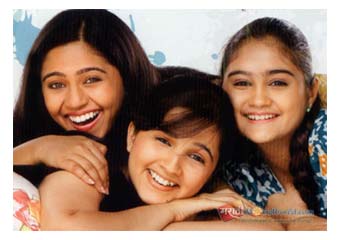
It is Anju, who dares to complain against her father in the initial part of the film and plays the narrator throughout the film, till the climax, which finally turns into happy ending. The film does have some hard hitting dialogues to send across a strong message to the society. But, some of the scenes like reading long letters have consumed more time than required. However, the sincerity of the film maker in presenting the attitudes of different characters is to be appreciated. An arrogant father, a selfish Grandmother, a helpless housewife and three daughters with different nature, yet loving each other; have been well presented.
Sharad Ponkshe is at his best, in that role of a cruel father. Pratiksha finds a role, which literally tests her own patience, till she reacts in the final scene. She has done a good job. Jyoti Subhash perfectly fits into the character of an orthodox old woman. Among the girls, both Mrunmayee and Neha are at their best, with wonderful performances. Neha in particular finds an opportunity to play a real angry young girl, who shows her guts to leave the house, to be an independent girl. Aishwarya has less scope in this film; but she has played her part very well. The director does go on to show the casting couch mentality in media, when an ad and film maker ( Chinmay Mandlekar) promotes Anju in the glamour world. Sushant Shelar in that limited role of a college professor looks natural.Mohan Joshi is just namesake in this film.
Music does not have much scope in this film, but Vaishali Samant’s two songs in the background penned by Saumitra on the music of Milind Ingale are thought provoking.
‘Mokala Shwaas’ is certainly not an entertaining film, but a path breaking film, with a message. Watch this film to witness the wonderful performances of all the artistes. Almost sure to be nominated for awards, in different categories.
Dance based ‘Aayna Ka Bayana’ is a Dream seller
 |
Rating: na
Banner: LFS Media & Entertainment Pvt. Ltd., Im Shanti Universal Producer: Akshara Film Division Director: Sameet Kakkad Music: Ajit Sameer Choreography: Umesh Jadhav Cast: Sachin Khedekar, Amruta Khanvilkar, Rakesh Bapat, Ganesh Yadav, Siddhesh Pai, Sanket Farad, Praveen Nair, Rahul Kulkarni, Dinesh Kamble, Amit Rokade Movie Review by: Ulhas Shirke |
Dance and Music based reality shows on small screen have created an opportunity for many talented youngsters including kids. Watching the popularity of such dance based reality shows, film maker Sameet kakkad has this time offered a dream seller in the form of ‘Aayna Ka Bayana’ a rock Music based Marathi film. The film targets all those young dance lovers, who have dream in their eyes to turn pop star one day. No wonder, the film is a tribute to Pop star Michael Jackson, who has been clearly mentioned, besides playing his dance video in one of the most important scenes in this film.
Aayna Ka Bayna, Dance‘Aaynaa Ka Bayana’ with a tagline ‘Ghetlyashivay Jayana’ clearly speaks about the struggle of 9 young boys from a remand home, who show keen interest in dance, when their Counselor cum dance teacher( Amruta Khanvilkar) turns them into experts in all forms of western dances. But, the warden of the Remand home Mr. Sathe( Sachin Khedekar) is very much opposed to such a practice inside his campus. For him, all inmates are criminals and not entitled for such liberties. But, Amruta who plays a protagonist in this film, dares to challenge the warden, who is a former Police Officer.
With the help of her choreographer friend ( Rakesh Vashishta) she offers these boys a platform, after they escape from the remand home, experiencing mayhem at that place. But, their participation at the competition is full of hurdles, as the warden with the help of police is after their arrest. In the meanwhile, the audience is shown the past life of few boys in the group, to give an idea under what circumstances they had committed a crime and landed at the remand home. ‘If there’s a will, there’s a way’. And, the group of these young dancers, finally succeed in achieving their goals, with happy ending.
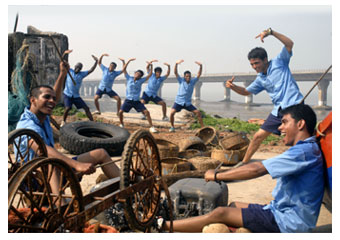
The film does have a story to narrate, besides offering western style music composed by Ajit Sameer, to suit the theme of the film. But, the story part is not much, as the director is clever enough to narrate the scenes of few youngsters in quick flashbacks, focusing his attention more on dance and music. In the initial stages, he has picturised the dance based songs at different famous locations of Mumbai, on the choreography of Umesh Jadhav. But, it is the superb cinematography of Sanjay Jadhav, which make all such moments more appealing. The dances in the concluding part, including the climax have been over stretched in a typical melodramatic style; in this nearing 100 minute long film.
The nine boys with extra ordinary dance skills, who have been picked up on the basis of their performance in TV reality shows, have also acted well, besides displaying their dance skills. Sachin Khedekar is impressive in the role of a warden. He has also given a surprise through a song picturised on him displaying his flexibility through few dance steps. It was nice to see veteran actress Sulbha Arya, in a small role of a mother of one of the inmates from the remand home. Others in the supporting cast have done their jobs well. But, it is Amruta khanvilkar, who puts up an astounding emotion filled performance in the role of Dance teacher cum counselor. Her concern for the society is clearly noticed through her body language and spontaneous expressions. Santosh Juvekar makes a special appearance as a show anchor, in the concluding part of the film, in his own style.
Director Sameet Kakkad has paid more attention on western dance and music; but, has also passed a social message, through few emotion filled scenes and hard hitting dialogues at appropriate places in the film. Though targeted at youngsters, the film does pass a social message.
‘Night School’ has a message for Government
 |
Rating: na
Banner: Vanmali Films Producer: Nitin Mavani Director: Mansingh Pawar Music: Vabhru BHosale Cast: Sandeep Kulkarni, Prasad Pandit, Deepa Chaphekar, Shrikant Yadav Movie Review by: Ulhas Shirke |
At a time when Municipal authorities in Mumbai are in the process of closing down Marathi schools for want of attendance and unable to maintain the premises; here comes a film with a timely message to the Government. The new Marathi film ‘Night School’ produced by Nitin Mawani and directed by Mansingh Pawar makes the administration realize the importance of education to the labour and poor class, who are unable to attend day classes. The film stresses the importance about survival of one such night school in Mumbai, which needs Government support and which is the target of builders to acquire the land occupied by school for redevelopment project.
45 years ago there was an English film ‘To Sir, With Love’ by E. R. Braithwaite, starring Sidney Poitier which dealt with social and racial issues in an inner city school. In that film, the teacher takes up the challenge to educate the notorious and elderly students from one secondary school. Now, writer director Mansingh Pawar has taken up a similar type of social issue in his new Marathi film ‘Night School’ which is so relevant to Indian context, where education plays an important role in uplifting the society.
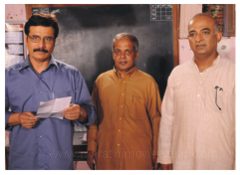
In India, so many youngsters are required to leave their school mid way, due to poor financial conditions. They work during daytime as Courier boys or labourers in Hotels, shops and restaurants; but, there is a desire within them to take education side by side. Inspired by the two former chief ministers of Maharashtra, who attended Night school and reached to this position; the director has taken up this issue of one of the Night Schools in Mumbai. There is a mention about this reality in one of the dialogues uttered by an important character in the film. Shivaji Night School shown in the film located in the populated area of Mumbai, is on the verge of closure. Appasaheb (played by Prasad Pandit) whose father started this 60 year old institution, is managing this school with great difficulty.
During a ceremony to honour best teachers in the city; Appasaheb challenges Mr. Deshpande (Sandeep Kulkarni) who has bagged best teacher’s award for getting 100% results of his 10th std batch. “If you really have to prove your capability as a teacher show 100% results of a school which has working and poor class students?” he questions. Mr. Deshpande does accept Appasaheb’s challenge and joins his Shivaji Night School.
After joining the school, Mr. Deshpande prepares his action plan and ensures 100% attendance in school. He himself approaches families of many students and understands individual problems of each one of them. He also offers shelter to one of the poor students in his own house. Mr. Deshpande’s strategies works wonders, in spite of facing hurdles. He encourages sports and picnics. Finally, it is happy ending with Shivaji Night School scoring 100% results with a topper in Maths in Board Exam from his school.
Director Mansingh Pawar has presented the subject very well, with total sincerity, without adding unnecessary glamour into the screenplay. There are only two songs in the film on the music of Babhu Bhosale, that too before interval. The post interval session has been focused on the struggle for survival of the school. In fact 25 out of the 40 students from this film are real life Night School students, making an impact about the actual situation. However, the scene showing the serious ailment of one of the bright students from the school, has been dragged a little longer, with repeated shots of his vomiting and writing exam paper in ambulance.
Otherwise, the sequences like Mr. Deshpande offering shelter to a deserving student, his subsequent interaction with his wife, his strategies to bring students together and his efforts of creating awareness about importance of education to the family members of the students; and above all the students raising the money to pay electricity bill of the school, have been picturised well.
Sandeep Kulkarni is at his best in the role of Deshpande teacher, showing total commitment to his character. He seemed to be totally involved into this challenging role, offered to him. Deepa Chaphekar, who plays his wife doesn’t have much scope; but she does her job well. In the role of Appasaheb, veteran actor Prasad Pandit is a perfect choice. Shrikant Yadav is impressive in the role of a notorious bar owner, who later reforms, watching the struggle of the students. All others in the supporting cast have done a good job. The film is a timely message to the Government.
‘Shree Partner’ retains Va Pu’s original flavor
|
Rating: na
Banner: Parv Creation, Samruddhi Creation Producer: Vimal Lohane, Sameer Ramesh Surve Director: Sameer Ramesh Surve Based on Novel: ‘Partner’ Music: Nilesh Moharir Cast: Satish Pulekar, Padmanabh Bind, Shweta Pagar, Lalan Sarang Movie Review by: Ulhas Shirke |
Vasant Purushottam Kale, popularly known as Va Pu, was a renowned Marathi novelist.
He wrote about 60 books but his most popular novel was ‘Partner’. Va Pu himself was so impressed by the character of Partner from his book that he himself played the title role in a Marathi play, which was staged sometime during early 80s. Being an architect by profession, the writer had rightly chosen ‘Accommodation problem in Mumbai’ as the backdrop of this love story of a young couple.
Va Pu’s ‘Partner’ was attempted in the form of a TV serial in the past. And now, Sameer Ramesh Surve makes his debut as a director through a feature film ‘Shree Partner’ based on this novel. Sameer, a great admirer of Va Pu’s literature, was very keen on making a film on ‘Partner’. Finally when he acquired the official rights, his dream came true.
Through this film, the director had the liberties of glorifying the characters; but he preferred to stick to originality in the script and only added few meaningful melodious songs to support the expressions of the three main characters in this film; i.e. the central character of Partner( Satish Pulekar), Shree ( Padmanabh Bind) and Kiran ( Shweta Pagar). All the songs are played in the background, to create their desired impact. Some intimate love scenes have also been shot with decency.
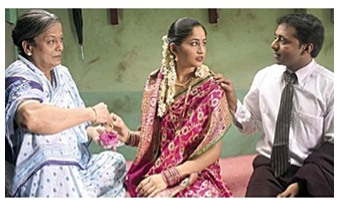
Very effectively, these three characters have been presented in the film’s screenplay so that the audience get the feeling of reading the original novel. Shree’s first meeting with Kiran, his first interaction with his so called ‘Partner’, who later offers him accommodation in the corridor of his house and later turns his Guru; his exploitation by his selfish mother, brother and sister in law, everything has been shown realistically. The director has cleverly used the term ‘third person’ making the life of Shree miserable.
The writer’s philosophy on alphabets W & M and using the same to show how a Wife becomes wiser after becoming Mother herself, have been picturised well. Though script is the heart of the film, it is the mesmerizing music of Nilesh Moharir , sensible lyrics of Ashwini Shende and melodious voices of Swapnil Bandodkar, Bela Shende and Madhuhree make this film more appealing. Deepali Vichare’s creative choreography during one of the songs and Sandeep Dhumal’s fabulous cinematography also invites attention.
In the central role of Partner, Satish Pulekar has given full justice to his fun loving but helpful character. Talented stage actor Padmanabh Bind plays the role of Shree with responsibility. Shweta Pagar, who makes her acting debut through this film, in an important role of Kiran, has proved that she is an actress to reckon. Perhaps, her training at Anupam kher’s acting school, has boosted her confidence . Lalan Sarang in the role of Shree’s mother doesn’t have much to offer, except for one scene, where she finds some scope. Others in the supporting cast have done a good job. ‘Shree Partner’ is certainly a well presented film, for retaining the original flavour of the celebrated writer.
‘Langar’ hits out at blind faith
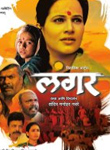 |
Rating: na
Banner: Shree Ganesh Marketing & Films Producer: Kumari Niharika S. Phadtare Director: Sandeep M. Naware Story: Sandeep M. Naware Music: Mandar Khare Cast: Ravi Kale, Manawa Naik, Aditi, Kishori Shane-Vij, Vinay Apate, Pankaj Vishnu, Milind Shinde, Bharat Ganeshpure, Namrata Gaikwad Movie Review by: Ulhas Shirke |
Time has changed and reforms are welcomed. But, still customary practices with blind faith, are followed in some villages in our country. Produced by Niharika Sunil Phadtare and directed by Sandeep Manohar Navare, new Marathi film ‘Langar’ throws light on injustice to children from a particular community in a village, where parents offer their children to God, just to keep their vows to God. One such girl Malan who is studying in school, is offered by her father (Vinay Apte) to the service of God, much against the wish of her mother (Kishori Shahane Vij), after she attains puberty.
Malan is taken away by her maternal uncle Jagan (Ravi Kale), who is himself deserted by his parents to the service of God. Deeply hurt, Malan soon forgets her family and joins the group of her uncle, aunty and others, to perform at religious functions with their folk performances entertaining the families. Men in this group are called Vaghya and women folks are called Murali. So, when Malan grows up, she is identified as ‘Murali’ and has no right to marry, as she is offered to the God in marriage.
But, when Malan meets Yashwant (Pankaj Vishnu), he proposes to her and promises to marry her soon. Malan crosses her limits against the wish of her uncle. Yashwant, who goes to city for some legal case, fails to return. Even her Uncle proceeds to other villages in search of work. When the uncle returns, he is criticized by the villagers and unable to bear the insults, he disappears one day. Yashwant does return back after six months; but, Malan refuses to marry him and drives him back. She takes over the business of her uncle and gives birth to her child. At the end of the film, which is actually the beginning, Malan is honoured by a Social activist, at a function held in a village, to boost her bold decision.
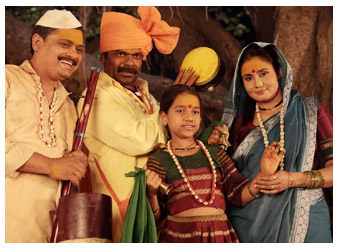
The film does pass a social message and hits out at blind faith and such customary practice. The effort of the film maker is sincere, capturing the right locations to create an impact. But, there is not much of opposition shown in the film, faced by the leading lady. Except for the reaction of her uncle and exchange of words with a local stone crushing contractor (Milind Shinde) who insults her; she doesn’t face much humiliation from the community. In fact, Jagan’s associates stand behind her. The character of Malan’s father though selfish, does not look realistic in some of the scenes, with his changing attitude. The same is the case with her brother Sagar’s character, who does not react, during reunion with his sister after several years.
It is also not clear, as to why the Uncle takes so long (almost few months) to return from his surrounding village trip, to discover that Malan is pregnant . Also there is no convincing explanation, as to why Yashwant returned after so many months. Moreover, when he is ready to marry Malan and accepts her would be child as his own child, why she refuses to marry him. Such incidences goes on to show that there wasn’t much sacrifice; but Malan repenting on her own mistake to trust a man of her choice. In fact, she is not left all alone; but, finds good helpful family of Jagan to support her.
In this film, Ravi Kale has come out with another superb performance in the role of Jagan. Kishori Shahane Vij does a good job through her emotion filled mother’s role. In the role of Malan, Manva Naik finds a better role for a change, to display variety through her acting and accent. Pankaj Vishnu is just fine in that limited role and so is veteran actor Vinay Apte in father’s role, though his character is not convincing. Bharat Ganeshpure and Namrata Gaikwad have done a good job, playing the family associates of Jagan. All others in the supporting cast have given their best.
Photography by Surya Mishra is good. He has captured the crowd scenes of devotees very well. Mandar Khare’s music is well suited to the theme of this film. ‘Langar’ is a festival kind of art film and not a mainstream cinema. And hence, those interested in such films and wanting to know the customary practices in villages, may like this film. But, will this film reach the target audience? Let’s wait and watch.
‘Pipani’ presents a Black comedy to deliver a timely message
 |
Rating: na
Banner: Tanishq Digital Eye Producer: Baburao Bhor Director: Gajendra Ahire Story, Screenplay, Dialogues, Lyrics: Gajendra Ahire Music: Chaitanya Adkar Cast: Makrand Anaspure, Chandrakant Kulkarni, Ravi Kale, Ramesh Dev, Kranti Redkar, Vaibhav Mangale, Satish Taare, Bharat Ganeshpure, Hemangi Kavi Dhumal, Vikas Samudre Movie Review by: Ulhas Shirke |
We are all aware that India is agriculture based country with around 60% of its population directly or indirectly dependent on agriculture, as their income. But, in India, Agriculture is often attributed as gambling with seasonal monsoon. The failure of seasonal monsoon, leads to a series of droughts. But, sometimes, un-seasonal monsoon showers, also creates havoc on crop with heavy loss, resulting in lack of better prices to farmers. But, mainly, it is the exploitation by the Middlemen, the main cause of a series of suicides committed by farmers across India.
It is said that on an average, one farmer commits suicide every 30 minutes in India. And, the state of Maharashtra is among the leading states reporting such tragedies. Latest released film ‘Pipani’ is all about this tragic situation in our country, which has been shot on the backdrop of a village in Vidarbha region in Maharashtra. Now, to highlight the situation, film maker Gajendra Ahire has used a plot, where a Hollywood film maker Freda Russel (Kristin Piesker) is shown making a feature film, to invite the attention of the world to this tragic state of farmers in this region and the reality behind it.
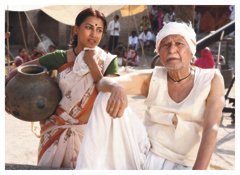
The film opens with a narrator Dnyaneshwar Tembhre (Chandrakant Kulkarni) a Circle officer of the Block, posted by the State Government. When he receives a request from his department to offer all the help to the visiting foreigner, he obliges by deputing Popat Jhadbuke (Makarand Anaspure) his most trusted man, to help the lady. Popat arranges her meetings with different people, beginning with Nanda (Hemangi Kavi), a widow, whose farmer husband has recently committed suicide.
Highly impressed with the location, when Freda returns with her unit team to shoot a film, her female character Kranti (an actress) seeks help from Nanda to be more realistic through her body language. The film also shows actor Ravi kale playing her husband and veteran actor Ramesh Deo playing her father in law. A Film which has been shot in this film, focuses more on the emotional part of the artistes and tries to show how the middlemen cheat the farmers from getting their dues. The scenes cover damage to crop due to un-seasonal rains and the helplessness of the farmers, forcing them to commit suicide.
But, what is more important is director Gajendra Ahire throwing light on other aspects; such as the effect of the happenings during the shooting, on the real life of the local villagers and how the middlemen in the film production department exploit the villagers. The director has tried to create humour through the character of Popat, who makes hard hitting statements in his typical style, blaming the administration for their apathy to uplift the lives of farmers with schemes and packages to boost their morale. There is one character who is shown as a helper to Popal (Vikas Samudre), who keeps on reminding him about the schemes.
Some form of humour is also created in one of the scenes, where Ravi kale, in an attempt to show his superiority to the actress kranti, tells her that he is a big actor, having worked with Mr. Amitabh Bachchan, when the veteran actor Ramesh Deo playing his old father is shown reacting, “So what ? I have performed with Rajesh Khanna and Amitabh Bachchan together.” There are many such humour filled sequences, which openly point out the neglect by the Government department, in finding the solution towards development of the Block. The transfer of the SDO to Pune, clearly goes on to say everything, after the shoot of the film is over.
The film conveys a strong message to the entire world about the ground level situation in this so called progressive nation. When Danny Boyle could make a film like ‘Slumdog Millionnaire’ projecting the slums of Mumbai in a cheap mediocre style, ‘Pipani’ has rightly concluded indicating that the film made by Freda Russel reflecting the real situation of the village can also win Oscars award. When Popat tells this news to an old villager, he replies, “What have we got?”. And, that delivers the film’s message. The film has openly used the advertisements of the sponsors, when Popat calls it an official break, before the commercial scene was played.
As a Hollywood director Kristin Piesker from Germany has done a good job. She is very much at ease, in her debut film. Makarand Anaspure is best suited in the role of Popat. Kranti Redkar finds the best opportunity to display her talent as an actress in search of a role, to win national award. Ravi kale, Chandrakant Kulkarni and Ramesh Deo look very natural in their respective roles. Vaibhav Mangle, Bharat Ganeshpure and Vikas Samudre have little to their share; but their presence counts. But, it is Hemangi Kavi, who invites all the attention. She presents a perfect village woman with her body language and excellent spontaneous expressions. Chaitanya Adkar’s music is well suited to this subject and backdrop and Chandrashekar Aiyer’s cinematography captures some of the realistic emotion filled scenes. Editing by Santosh Gothoskar is perfect. ‘Pipani’ produced by Baburao Bhor, is a sincere attempt to present reality through a cinematic format. You may call it a Black comedy.
